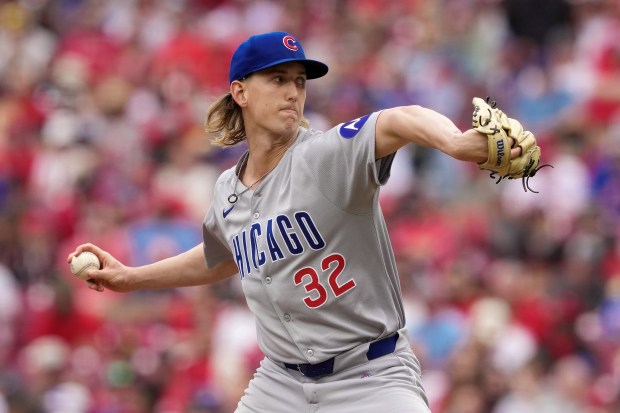The image of a cyclist in a field of grapes almost looks more like surrealism than photojournalism.
A rider in a teardrop-shaped helmet and skin-tight racing suit hunches over his aerodynamic handlebars in the middle of a Burgundy vineyard with no road in sight. He is framed between a woman and man waving flags who are facing in the opposite direction he’s going.
The image snapped by Associated Press photographer Jerome Delay in the fraction of a second is not so much an art photo as an artfully composed frame of professional cyclist Primoz Roglic going all out in the Tour de France — yet appearing to be frozen in place.
Shooting the three-week race that ended Sunday is as much about finding a unique angle that captures the scenic and quirky side of one of the world’s most epic competitions as it is about getting stage winners crossing the line with arms raised in victory.
The grueling contest covered around 3,500 kilometers (2,175 miles) over 21 days and climbed a total elevation of around 52,000 meters (57,000 yards), the equivalent of riding up Mount Everest nearly six times.
It was also an endurance contest for the photographers covering it. Long days were spent snapping photos from the back of a motorcycle, or speeding ahead to find an ideal vantage point and then racing to catch up with the riders or zipping down winding mountain passes at high speed.
“It takes everything out of you,” said Daniel Cole, who shot the event for AP with Delay. “It’s really intense physically, mentally, creatively. … It’s an absolute marathon to cover this.”
Cole and Delay are both avid cyclists with an understanding of a sport that can seem confusing to the casual observer with nuances of team tactics, breakaway gambits and the races within the race for best sprinter and hill climber.
Cole raced in college and Delay boasts of owning six bicycles. If they weren’t taking part as journalists, they’d be watching it. For Delay, who grew up in France but is based in South Africa, it’s a dream assignment.
“It’s stunning,” he said. “I’m a kid in a candy store.”
To get his photo in the vineyard, Delay scouted the route several times in advance of the race’s July 5th time trial, a short stage where each rider started at intervals in a race against the clock.
Delay planted himself in a gap between the grape trellises where fans were scattered along the road and then “waited and waited and waited.” The vines blocked his view up the road, so he had to judge riders’ arrival by the smattering of cheers and then he had a mere moment to get the shot as they sped past at about 50 kph (30 mph).
The main event is the contest for the maillot jaune, the yellow jersey worn by the leader with the fastest time overall — won by Tadej Pogacar this year — but the spectacular countryside plays a supporting role that can steal the show.
Postcards of the colorful peloton coursing through old world villages, riders bobbing in a sea of sunflowers or strung out in a line streaking down a pass in the Alps serve as love letters to this corner of Europe.
Cole, who was shooting his fourth tour, likened it to taking a road trip through France that’s half sports story and half a feature.
Just as the tour passes in the blink of an eye, photo opportunities vanish as quickly they appear. One of the rules of the road for motorcycles transporting photographers is that you cannot turn back. Scouting for vantage points at 80 kph (50 mph) can become an exercise in frustration as you realize you’ve shot past a good place to take a photo.
“Once you see something it’s almost too late to stop,” Cole said. “You start accumulating these failures one by one. You play this game where you try to get over the things you missed.”
Beyond the sweeping views, there are the small details, quiet moments in the race and vignettes that capture how the sport is interwoven in the culture of the country it circles every July.
There’s the lone breakaway rider seemingly levitating above a field of wheat. There’s former winner Geraint Thomas and teammates huddled under an umbrella before a rainy race start. There’s a man dressed as a monk waving a French flag who symbolizes the obsessive fans who arrive early to picnic and sip wine as they wait hours for the race to quickly pass by.
“Every little part of France has the Tour de France for 10 seconds and then it’s gone forever,” Cole said.
Cole talked himself into homes lining the route, where the owners with front-row seats stood in open doorways to glimpse the rolling spectacle. In a garage, a family had abandoned a table of food to cheer the riders, close enough to feel the breeze and hear the buzz of the peloton whizzing by.
When they returned to the table, the tour was gone and so was Cole. He was on the motorbike, dashing ahead to catch the riders and find his next shot.



